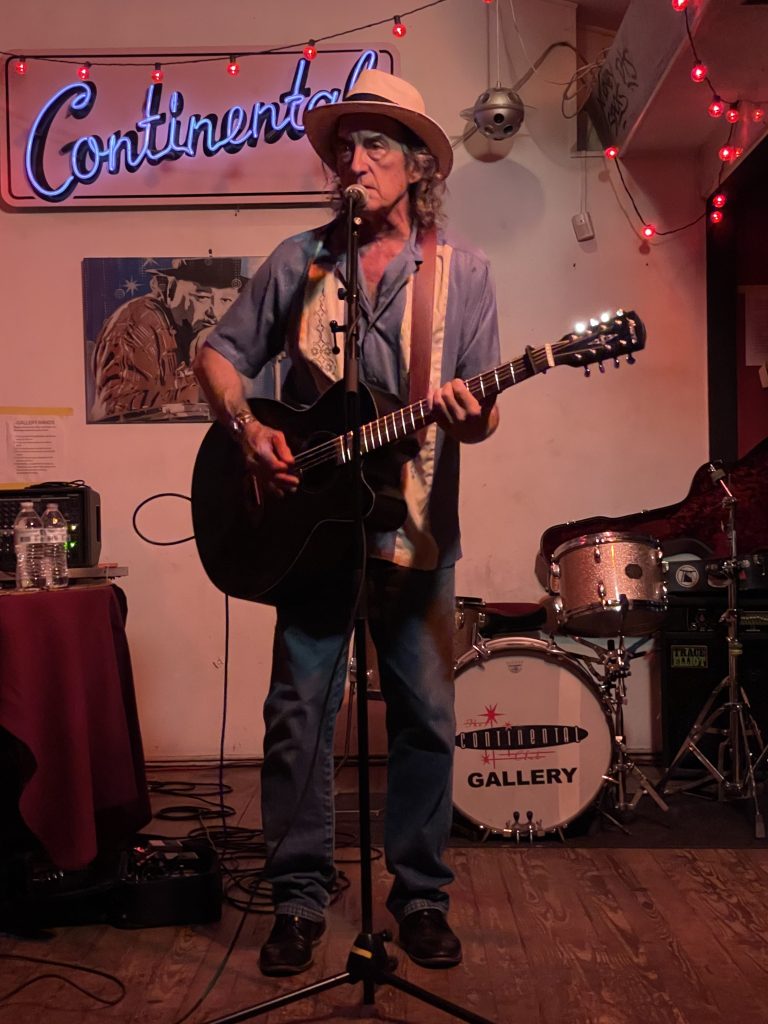Three songs by James McMurtry

‘I see some folk enjoyed South By so much they decided to stick around,’ James McMurtry said from the stage, spotting me in my baseball cap near the front of Austin’s Continental Club, the best music venue I’ve come to know. I was watching saw him perform for the second time in eight days. Indeed, I enjoyed myself so much that I went back a third time on my last Wednesday night out in Austin, to see a double bill of his solo show at the club’s upstairs gallery, followed by a raucous show by Jon Dee Graham and his band downstairs. I wrote about Graham a few months ago (scroll down) and now feels like a good time to write about McMurtry. There’s a big catalogue to go at, so, having seen him three times in three weeks, it feels right to focus on on three songs of his that I love.
I first saw McMurtry about fifteen years ago, when he and his band were touring the UK. I checked out his new album and loved the title track, ‘Just Us Kids.’ I knew his dad’s work through the screen, having snuck into ‘The Last Picture Show’ when I was thirteen. It was a good gig. Afterwards I chatted to his keyboard player, Ian McLagan (Mac) formerly of The Faces and Small Faces, but not McMurtry himself. He had a moustache that seemed to give him a permanent snarl, the same quality you found, I thought, in some of his lyrics. I picked up his next album but didn’t check out his back catalogue. However, when I saw that he was playing a solo gig during the South By South West festival I knew I had to see him. The place only held a hundred or so and I got there half an hour early, listening to Gruff Rhys and his band play a free show across the road. I queued patiently and made new friends, with whom I shared a sofa directly in front of the (not really a) stage.
The moment McMurtry began to sing ‘Canola Fields’ from his most recent album The Horse and the Hounds I knew I was in the right place. Hearing his songs performed up close, without a band, makes it much easier to sink into the songwriting, absorb the words. And damn, those words are good, lyrics for grown-ups who’ve been round the block a few times.
We met up in Brooklyn before it went hipster
You carried your keys in your fist
In a way-back corner of a cross-town bus
We were hiding out under my hat
Cashin’ in on a thirty year crush
You can’t be young and do that
Canola, it took me a while to work out, is what we Brits call Rape, source of rapeseed oil, the bright yellow flowers of which you see in large tracts all over the country in spring and summer.
McMurtry had shaved off the moustache and talked more between songs than he had at the Maze in Nottingham. His persona was wry but benevolent, and he made a point of reminding us to tip the waitress at the interval (she mixed a mean margherita, I have to say). He also – and I hope this doesn’t come over as any kind of insult – sang the songs notably better than he does on the albums. Older songs that hadn’t hit me hard came alive in a new way as he sold them to us in these acoustic versions, and although the band played a cracking version of ‘Canola Fields’ six days later (his band has a Tuesday night residency when he’s in town), I preferred the acoustic one, here aided beautifully by his occasional singing partner Betty Soo. I’m not comfortable with American gun culture whereas McMurtry is a hunter. But I joined in the laughter for the opening line of ‘Copper Canteen’.
Honey’ don’t you be yellin’ at me when I’m cleaning my gun.
Not that this is McMurtry speaking as himself. He’s described what he does in song as being much what his dad did in novels and films: telling stories. In a recent Rock’s Back Pages podcast with Robert Hilburn, whose biography of Randy Newman I’m looking forward to, there was an archive interview with Randy, who talked about how he invented characters for his songs, with the lyric being from their point of view, and he was surprised that more writers didn’t do the same thing.
This is what McMurtry does, and, while some of his songs are clearly him talking (he’s criticised one of his most popular songs for being one long rant against the last Bush administration), mostly he writes in character, and the narrator of ‘Copper Canteen’ soon wins our sympathy. He and his wife run a store. They turned into their parents when they were still in their teens. But now
The big boxes out on the by-pass are shaving us thin
I guess we’ll hold on a couple more years ’til the pension kicks in
Then we’ll sell all the stock in the store, leave only the lock on the door
And wonder what then.
McMurtry lives in a small town, thirty miles outside Austin, and writes, for the most part, about Texans, without cliches or sentimentality but with plenty of affection, insight and humour. Those songs also, especially in their solo versions, get stuck in your head. For instance, I twice heard him play a song he hasn’t recorded yet (I asked) called ‘Pinocchio in Vegas.’ As a writer, I’m a bit edgy about recording/sharing songs that a writer has yet to release, so only recorded him doing the first verse when I saw him for a third time in three weeks, upstairs again at the Continental Club. But it turns out McMurtry is very relaxed about all this stuff, and there’s an official version with Betty Soo on the internet, albeit with the words ‘dick’ and ‘fuck’ bleeped out. (There’s a good ‘Canola Fields’ from the same show, too).
The verses and choruses initially appear to be about two different things. It begins
‘Pinocchio’s in Vegas with his eyes on the prize
He’s a real boy now. His dick grows when he lies.’
It’s up to the listener to make the connections between the character who had to had to ‘sue Walt Disney over Copyright Control’ and the questions in the chorus
Who were my grandmother’s friends
Who used to take me fishing every now and then?
Who were the neighbours next door
When I was still crawling on the floor?
The chorus changes two lines every time he sings it (the friends came to play bridge, for instance) and, in its final iteration, the last line becomes ‘I can’t call you up and ask any more.’ For me, this poignant line changed the whole meaning, or, perhaps better to say, cast a new light over the rest of the lyric, which, I posit, was inspired by the recentish death of his father. Of course, this isn’t how stories or songs work – their meaning is derived from whatever the individual reader/listener is able to make of them and the autobiographical fallacy is a common, misguided way of reducing that meaning to something crude. Nevertheless, as Hilburn pointed out, many of Newman’s friends (who freely talked to the biographer, with his subject’s blessing) say that they can hear bits of the real Randy in nearly all of his songs, no matter how distant from the point of view in the song’s subject the artist might be. I suspect the same is true of McMurtry, a similarly classy writer. There aren’t that many of them.
I told a friend recently that McMurtry was my favourite living singer/songwriter. It was only a slight exaggeration. I don’t count Dylan in this equation – he exists in his own universe – and Newman, Simon and Mitchell are all pretty much retired, which only leaves the overproductive Neil Young as competition, with maybe Craig Finn and Jason Isbell from a younger generation. The only person from McMurtry’s generation (my generation) I hold the same affection for is Aimee Mann. She’s someone else with classic song craft, and often writes in character. Sadly, she doesn’t play the UK much any more (I interviewed her in 2008, which may have been the last time I saw her, one of only a handful of interviews I’ve done over the years). But if you get the chance to see James McMurtry, I urge you to take it, even if you have to travel to Austin to do so.
